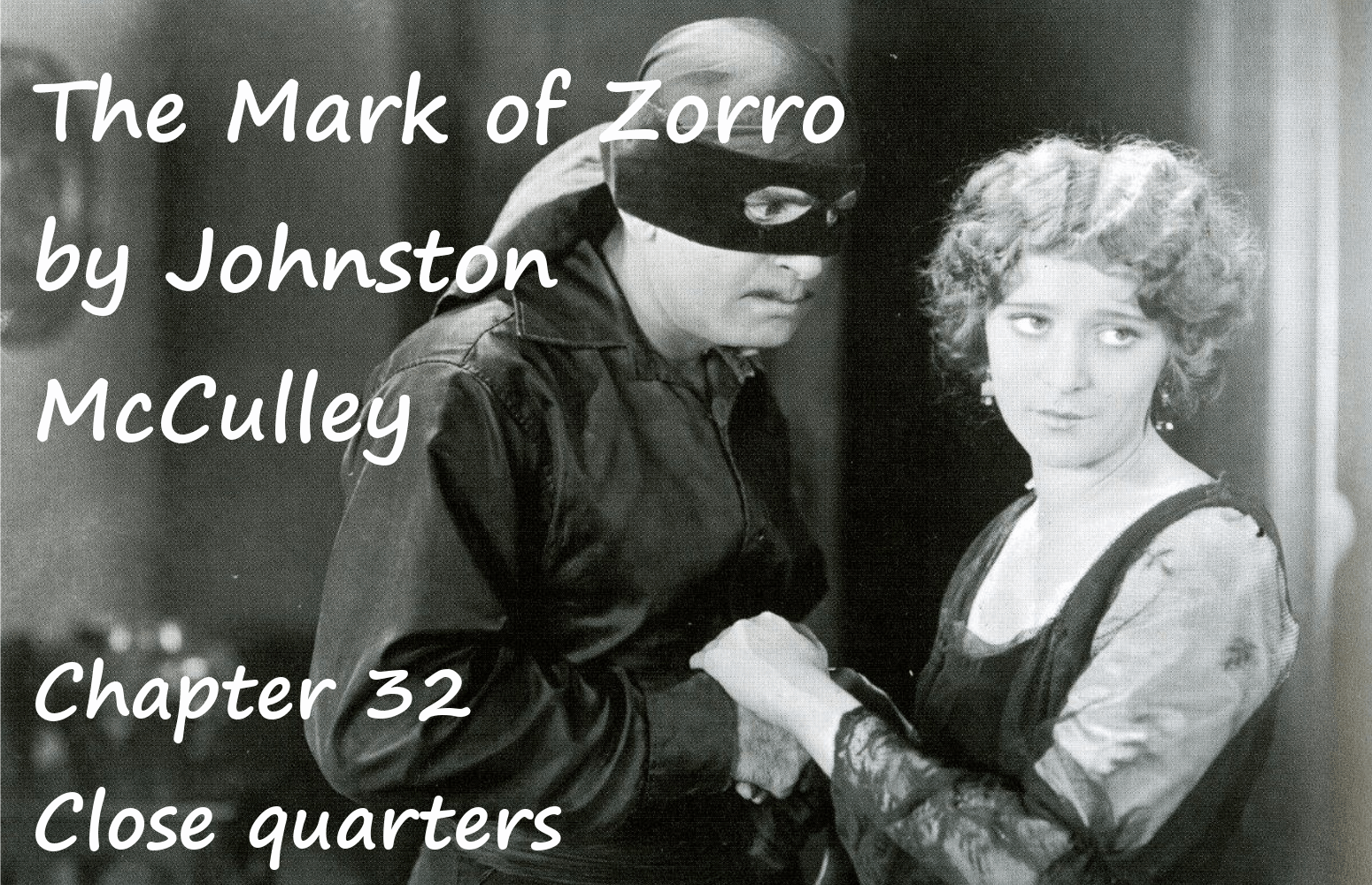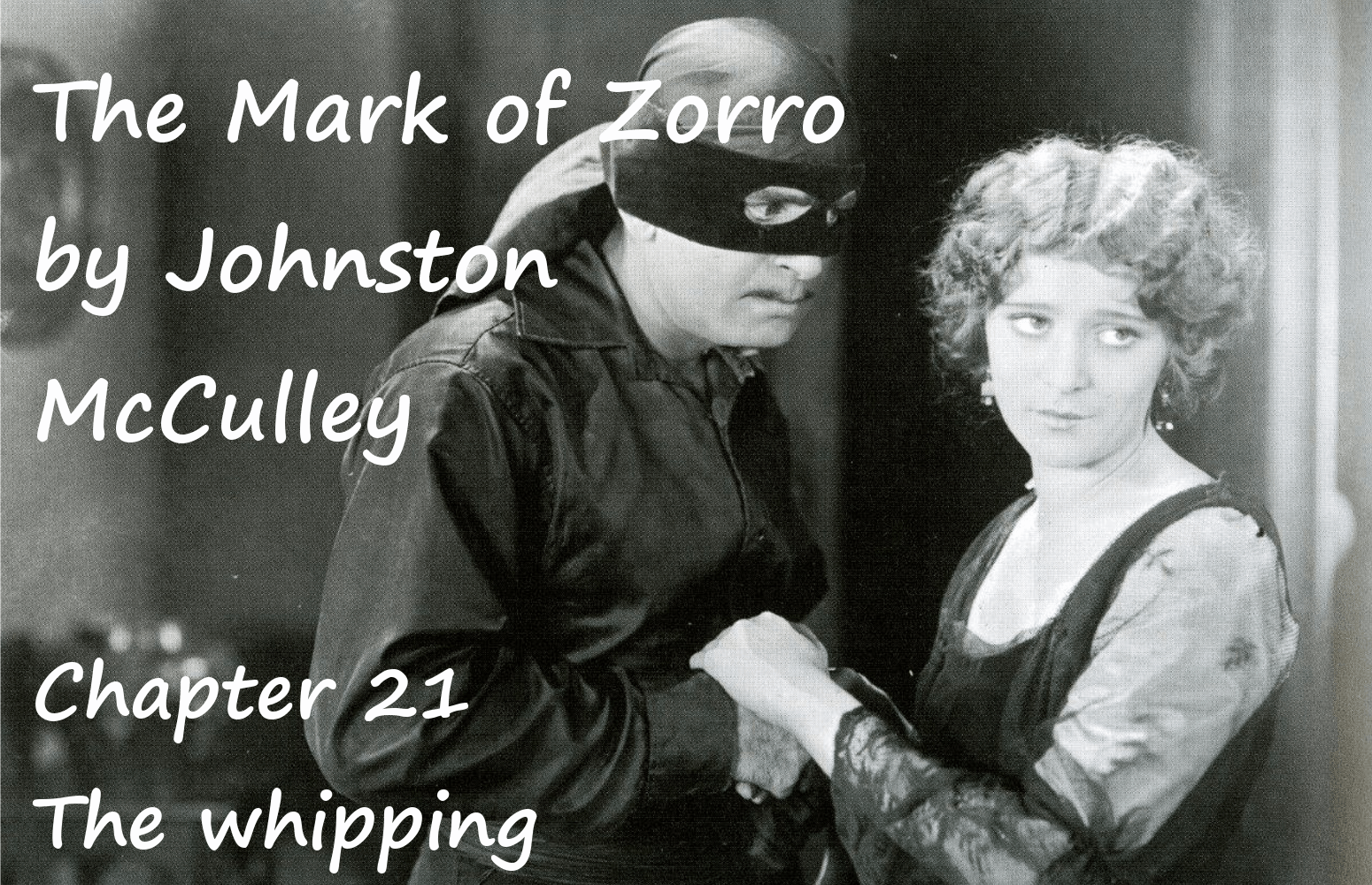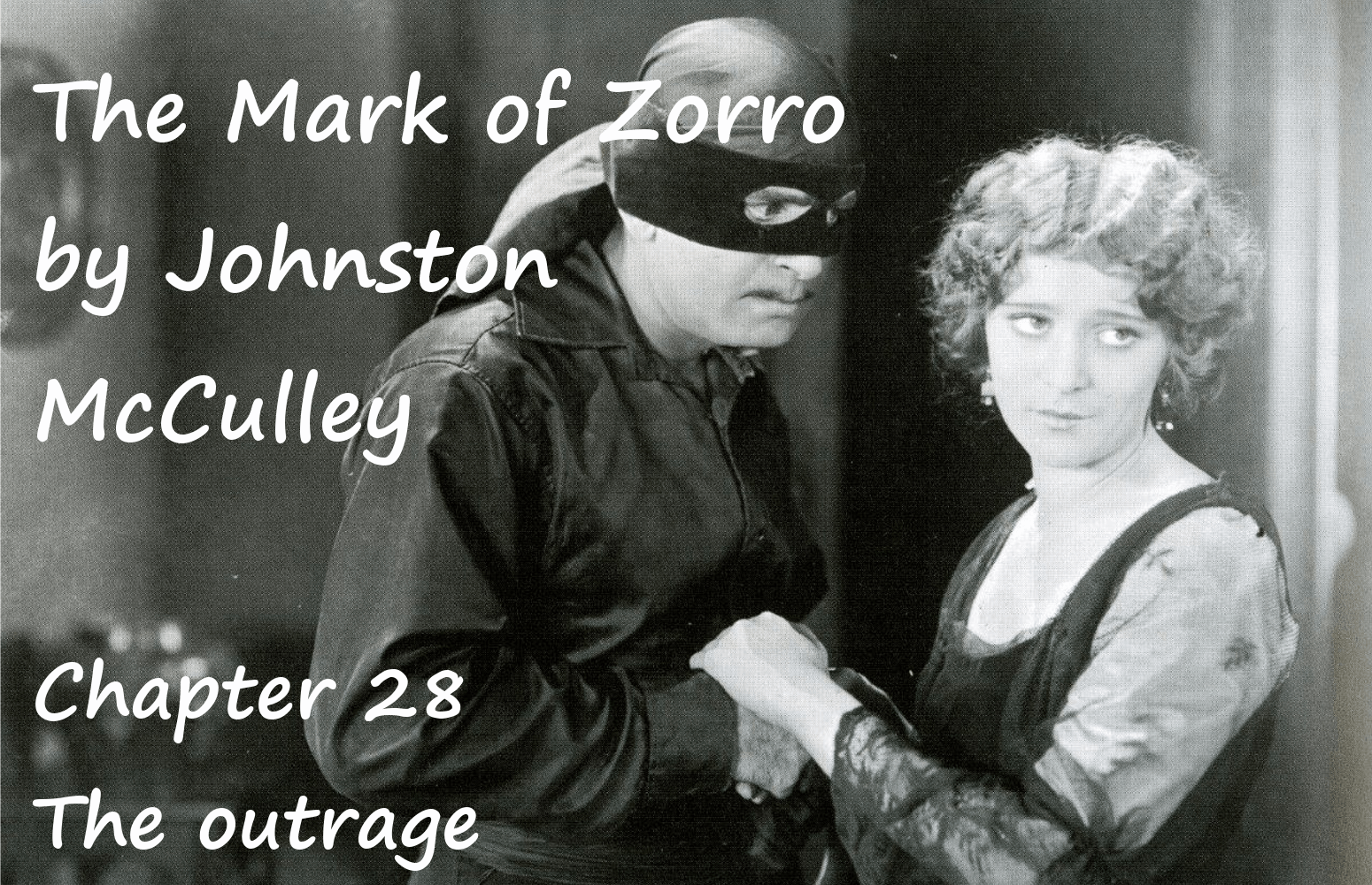The Mark of Zorro chapter 32 Close quarters
The Mark of Zorro chapter 32 Close quarters
Author McCulley, Johnston, 1883-1958
Title The Mark of Zorro
Note Published serially under the title: The curse of Capistrano.
Language English
Copyright Status Public domain in the USA.
Over the hills peeped the moon.
Señor Zorro would have had the sky heavy with clouds this night and the moon obscured, could he have had things his own way, for now he was riding along the upper trail, and his pursuers were close behind and could see him against the brightening sky.
The horses ridden by the troopers were fresh, too, and the most of those belonging to the men of his excellency’s escort were magnificent beasts as swift as any in the country, and able to endure many miles of travel at a terrific pace.
But now the highwayman thought only of getting all the speed possible out of his own mount, and of making as great as he could the distance between himself and those who followed; for at the end of his journey he would need quite a little time, if he was to accomplish what he had set out to do.
He bent low over the señorita, and felt his horse with the reins, making himself almost a part of the animal he rode, as any good horseman can. He reached the crest of another hill, and glanced back before he began the descent into the valley. He could see the foremost of his pursuers.
Had Señor Zorro been alone, no doubt the situation would have caused him no uneasiness, for many times he had been in a position more difficult, and had escaped. But the señorita was on the saddle before him now, and he wanted to get her to a place of safety, not only because she was the señorita and the woman he loved, but also because he was not the sort of man to let a prisoner he had rescued be recaptured. Such an event, he felt, would be a reflection on his skill and daring.
Mile after mile he rode, the señorita clinging to him, and neither speaking a word. Señor Zorro knew that he had gained some on those who followed, but not enough to suit his purpose.
Now he urged his horse to greater effort and they flew along the dusty highway, past haciendas where the hounds barked in sudden alarm, past the huts of natives where the clamor of beating hoofs on the hard road caused bronze men and women to tumble from their bunks and rush to their doors.
Once he charged through a flock of sheep that were being driven to Reina de Los Angeles and the market there, and scattered them to either side of the road, leaving cursing herders behind him. The herders gathered the flock again, just in time to have the pursuing soldiers scatter it once more.
On and on he rode, until he could see, far ahead, the mission buildings at San Gabriel glistening in the moonlight. He came to a fork in the road, and took the trail that ran to the right, toward the hacienda of Fray Felipe.
Señor Zorro was a reader of men, and he was trusting to his judgment to-night. He had known that the Señorita Lolita would have to be left either where there were women, else where there was a robed Franciscan to stand guard over her, for Señor Zorro was determined to protect his lady’s good name. And so he was pinning his faith to old Fray Felipe.
Now the horse was galloping over softer ground, and was not making such good speed. Señor Zorro had little hope that the troopers would turn into the San Gabriel Road when they arrived at the fork, as they might have done had it not been moonlight and they had been unable to catch sight now and then of the man they pursued. He was within a mile of Fray Felipe’s hacienda now, and once more he gave his horse the spurs in an effort to obtain greater speed.
“I shall have scant time, señorita,” he said, bending over her and speaking into her ear. “Everything may depend upon whether I have been able to judge a man correctly. I ask only that you trust me.”
“You know I do that, señor!”
“And you must trust the man to whom I am carrying you, señorita, and listen well to his advice upon all matters concerned with this adventure. The man is a fray.”
“Then everything will be well, señor,” she replied, clinging to him closely.
“If the saints are kind, we shall meet again soon, señorita. I shall count the hours, and deem each one of them an age. I believe there are happier days ahead for us.”
“May Heaven grant it!” the girl breathed.
“Where there is love, there may be hope, señorita.”
“Then my hope is great, señor.”
“And mine!” he said.
He turned his horse into Fray Felipe’s driveway now, and dashed toward the house. His intention was to stop only long enough to leave the girl, hoping that Fray Felipe would afford her protection, and then ride on, making considerable noise and drawing the troopers after him. He wanted them to think that he was merely taking a short cut across Fray Felipe’s land to the other road, and that he had not stopped at the house.
He reined in his horse before the veranda steps, sprang to the ground and lifted the señorita from the saddle, hurrying with her to the door. He beat against it with his fist, praying that Fray Felipe was a light sleeper and easily aroused. From the far distance there came a low drumming sound that he knew was made by the hoofs of his pursuers’ horses.
It seemed to Señor Zorro that it was an age before the old fray threw open the door and stood framed in it, holding a candle in one hand. The highwayman stepped in swiftly and closed the door behind him, so no light would show outside. Fray Felipe had taken a step backward in astonishment when he had beheld the masked man and the señorita he escorted.
“I am Señor Zorro, fray,” the highwayman said, speaking swiftly and in low tones. “Perhaps you may feel that you owe me a small debt for certain things?”
“For punishing those who oppressed and mistreated me, I owe you a large debt, caballero, though it is against my principles to countenance violence of any sort,” Fray Felipe replied.
“I was sure that I had made no mistake in reading your character,” Señor Zorro went on. “This señorita is Lolita, the only daughter of Don Carlos Pulido.”
“Ha!”
“Don Carlos is a friend of the frailes, as you well know, and has known oppression and persecution the same as they. To-day the governor came to Reina de Los Angeles and had Don Carlos arrested and thrown into the carcel on a charge that has no true worth, as I happen to know. He also had the Doña Catalina and this young lady put in carcel, in the same prison-room with drunkards and dissolute women. With the aid of some good friends, I rescued them.”
“May the saints bless you, señor, for that kind action!” Fray Felipe cried.
“Troopers are pursuing us, fray. It is not seemly, of course, that the señorita ride farther with me alone. Do you take her and hide her, fray—unless you fear that such a course may cause you grave trouble.”
“Señor!” Fray Felipe thundered.
“If the soldiers take her, they will put her in carcel again, and probably she will be mistreated. Care for her, then, protect her, and you will more than discharge any obligation you may feel that you owe me.”
“And you, señor?”
“I shall ride on, that the troopers may pursue me and not stop here at your house. I shall communicate with you later, fray. It is agreed between us?”
“It is agreed!” Fray Felipe replied solemnly. “And I would clasp you by the hand, señor!”
That handclasp was short, yet full of expression for all that. Señor Zorro then whirled toward the door.
“Blow out your candle!” he directed. “They must see no light when I open the door.”
In an instant Fray Felipe had complied, and they were in darkness. Señorita Lolita felt Señor Zorro’s lips press against her own for an instant, and knew that he had raised the bottom of his mask to give her this caress. And then she felt one of Fray Felipe’s strong arms around her.
“Be of good courage, daughter,” the fray said. “Señor Zorro, it appears, has as many lives as a cat, and something tells me he was not born to be slain by troopers of his excellency.”
The highwayman laughed lightly at that, opened the door and darted through, closed it softly behind him, and so was gone.
Great eucalyptus-trees shrouded the front of the house in shadows, and in the midst of these shadows was Señor Zorro’s horse. He noticed, as he ran toward the beast, that the soldiers were galloping down the driveway, that they were much nearer than he had expected to find them when he emerged from the house.
He ran quickly toward his mount, tripped on a stone and fell, and frightened the animal so that it reared and darted half a dozen paces away, and into the full moonlight.
The foremost of his pursuers shouted when he saw the horse, and dashed toward it. Señor Zorro picked himself up, gave a quick spring, caught the reins from the ground and vaulted into the saddle.
But they were upon him now, surrounding him, their blades flashing in the moonlight. He heard the raucous voice of Sergeant Gonzales ordering the men.
“Alive, if you can, soldiers! His excellency would see the rogue suffer for his crimes. At him, troopers! By the saints!”
Señor Zorro parried a stroke with difficulty, and found himself unhorsed. On foot, he fought his way back into the shadows, and the troopers charged after him. With his back to the bole of a tree, Señor Zorro fought them off.
Three sprang from their saddles to rush in at him. He darted from the tree to another, but could not reach his horse. But one belonging to a dismounted trooper was near him, and he vaulted into the saddle and dashed down the slope toward the barns and corral.
“After the rogue!” he heard Sergeant Gonzales shouting. “His excellency will have us flayed alive if this pretty highwayman escapes us now!”
They charged after him, eager to win promotion and the reward. But Señor Zorro had some sort of a start of them, enough to enable him to play a trick. As he came into the shadow cast by a big barn, he slipped from the saddle, at the same time giving the horse he rode a cut with his rowels. The animal plunged ahead, snorting with pain and fright, running swiftly through the darkness toward the corral below. The soldiers dashed by in pursuit.
Señor Zorro waited until they were past, and then he ran rapidly up the hill again. But he saw that some of the troopers had remained behind to guard the house, evidently with the intention of searching it later, and so he found he could not reach his horse.
And once more there rang out that peculiar cry, half shriek and half moan, with which Señor Zorro had startled those at the hacienda of Don Carlos Pulido. His horse raised its head, whinnied once in answer to his call, and galloped toward him.
Señor Zorro was in the saddle in an instant, spurring across a field directly in front of him. His horse went over a stone fence as if it had not been in the way. And after him speedily came a part of the troopers.
They had discovered the trick he had used. They charged at him from both sides, met behind him, followed and strained to cut down his lead. He could hear Sergeant Pedro Gonzales shouting lustily for them to make a capture in the name of the governor.
He hoped that he had drawn them all away from Fray Felipe’s house, but he was not sure, and the thing that demanded his attention the most now was the matter of his own escape.
He urged his horse cruelly, knowing that this journey across plowed ground was taking the animal’s strength. He longed for a hard trail, the broad highway.
And finally he reached the latter. Now he turned his horse’s head toward Reina de Los Angeles, for he had work to do there. There was no señorita before him on the saddle now, and the horse felt the difference.
Señor Zorro glanced behind, and exulted to find that he was running away from the soldiers. Over the next hill, and he would be able to elude them!
But he had to be on guard, of course, for there might be troopers in front of him, too. His excellency might have sent reënforcements to Sergeant Gonzales, or might have men watching from the tops of the hills.
He glanced at the sky, and saw that the moon was about to disappear behind a bank of clouds. He would have to make use of the short period of darkness, he knew.
Down into the little valley he rode, and looked back to find that his pursuers were only at the crest of the hill. Then came the darkness, and at the proper time. Señor Zorro had a lead of half a mile on the pursuing soldiers now, but it was not his intention to allow them to chase him into the pueblo.
He had friends in this locality. Beside the highway was an adobe hut, where there lived a native Señor Zorro had saved from a beating. Now he dismounted before the hut, and kicked against the door. The frightened native opened it.
“I am pursued,” Señor Zorro said.
That appeared to be all that was necessary, for the native immediately threw the door of the hut open wider. Señor Zorro led his horse inside, almost filling the crude building, and the door was hastily shut again.
Behind it, the highwayman and the native stood listening, the former with pistol in one hand and his naked blade in the other.



